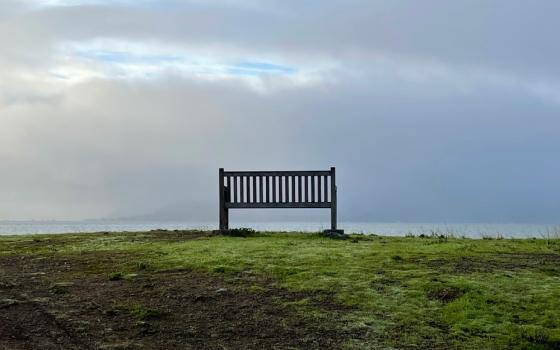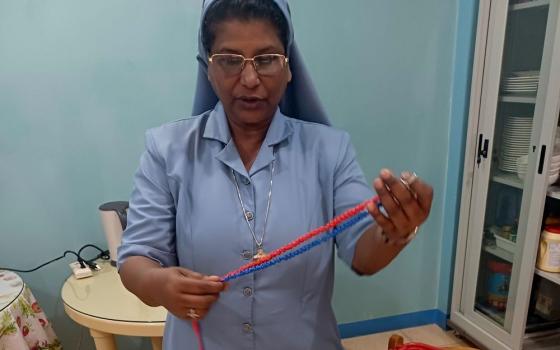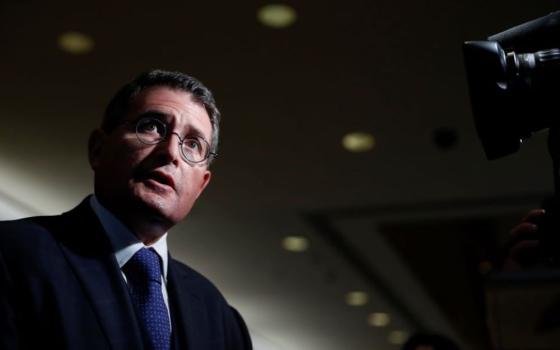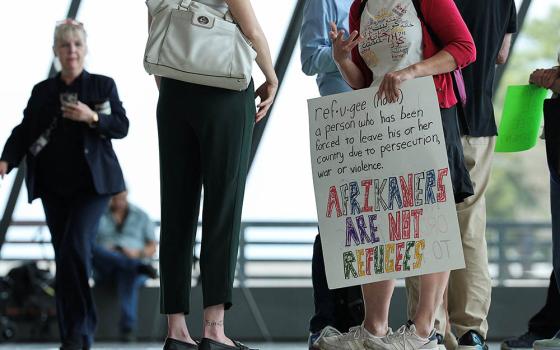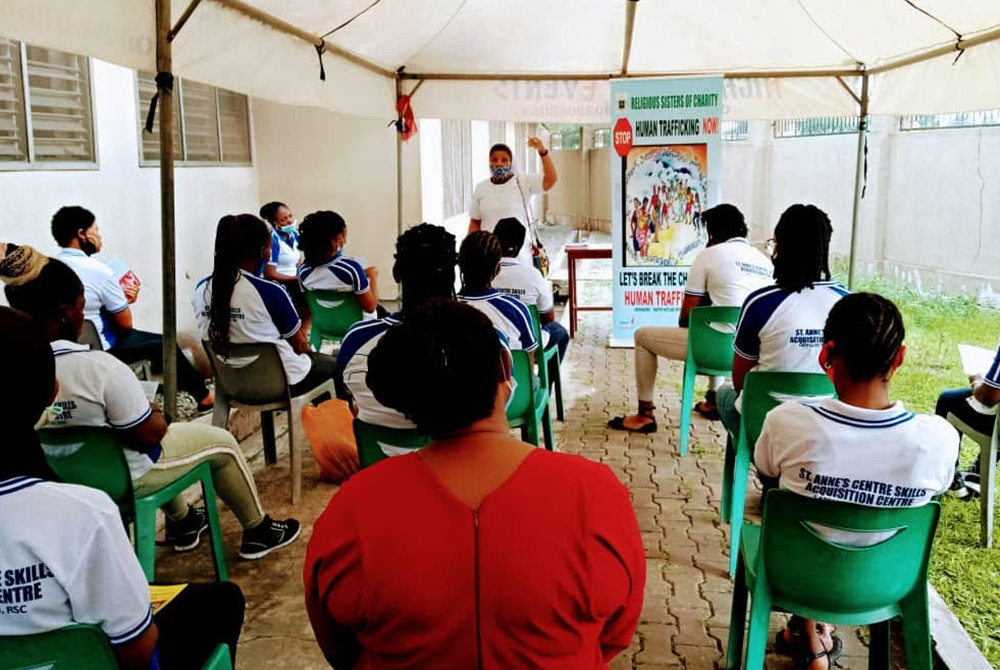
Sr. Gloria Ozuluoke of the Religious Sisters of Charity teaches participants on the dangers of human trafficking and how to end it, at a training workshop at St. Anne's Centre for Women and Youth Development Feb. 8 in Lagos, Nigeria. Despite challenges, Ozuluoke says they are not deterred in fighting trafficking. (Courtesy of Sr. Gloria Ozuluoke)
Nigeria has one of the highest rates of human trafficking in sub-Saharan Africa. But a very organized and active network of Catholic sisters is determined to change that by providing help to survivors and conducting education campaigns to prevent others from being victimized.
"Because trafficking of persons is on the increase despite efforts to end it, it has become one of the main projects of our ministry," said Sr. Gloria Ozuluoke of the Religious Sisters of Charity. The congregation has a corporate stance to abolish human trafficking, she added. "It is part of our ministry — not just on special days set aside to campaign against human trafficking, which we marked with prayers and training for women and youth. Other days, we also train people and do advocacy on human trafficking. It's a way of bringing to an end the social ills of human trafficking."
Her congregation, which has its regional house in Lagos and has 45 members in the country, and others are now preparing programs to mark the United Nations' World Day Against Trafficking in Persons on July 30. The Religious Sisters of Charity and others throughout Nigeria also held special prayer services and workshops on Feb. 8, the feast day of St. Josephine Bakhita, International Day of Prayer and Awareness Against Human Trafficking, as did congregations around the world.
Yet education and rescue efforts by her congregation and others transcend particular days and are constant, as she noted in an interview with Global Sisters Report. That focus is part of a massive campaign through July among women religious congregations in Nigeria, and in collaboration with nonprofits and government agencies focused on anti-trafficking, Ozuluoke said. For instance, the sisters work with the National Agency for the Prohibition of Trafficking in Persons, or NAPTIP, and the National Drug Law Enforcement Agency, or NDLEA, in combating trafficking and rehabilitating those affected by drug or substance abuse.
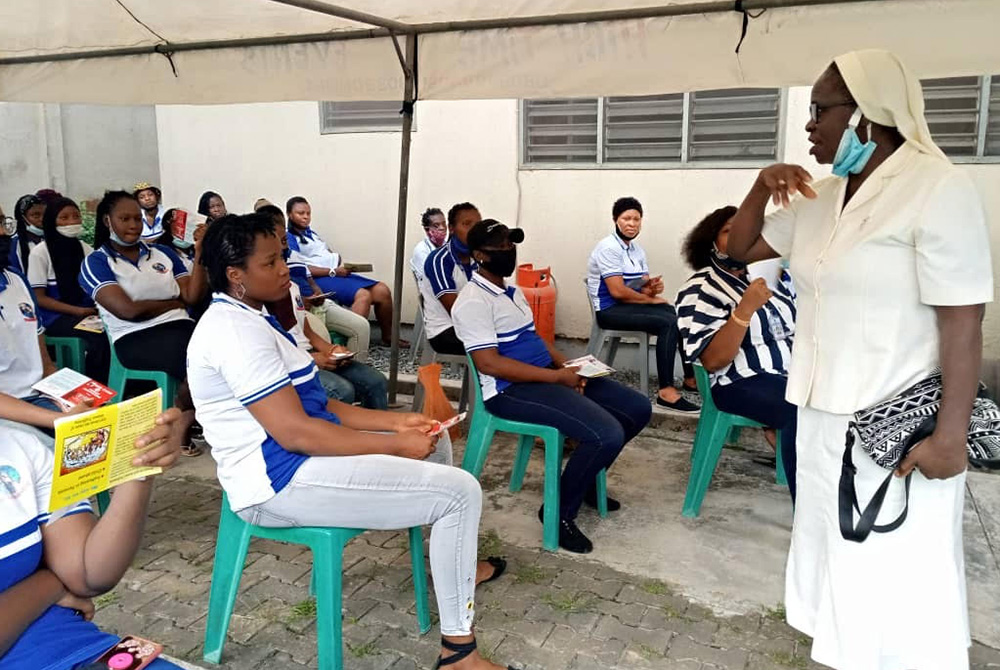
Sr. Justina Nelson of the Religious Sisters of Charity speaks during an anti-trafficking workshop at St. Anne's Centre for Women and Youth Development, Feb. 8 in Lagos. Nelson helps in coordinating activities of the Link Sisters, which are aimed at raising awareness in the rural areas. (Sr. Gloria Ozuluoke)
A 2020 report by the U.S State Department on Trafficking in Persons say Nigerian trafficking victims, "often exploited by Nigerian traffickers," were found "in at least 36 countries in Africa, Europe, and the Middle East. … Nigerian women and girls are subjected to sex trafficking within Nigeria and throughout Europe, including in France, Italy, Spain, Austria, and Russia."
Of the more than 181,000 migrants who traveled by sea from Libya to Italy in 2016, more than 37,000 were Nigerian, with Nigerian women and unaccompanied children accounting for 11,009 and 3,040 travelers, respectively, according to a 2017 report by the International Organization for Migration, the most recent such data available. The International Organization for Migration, or IOM estimates that about 80% of Nigerian women and girls arriving by sea in 2016 were likely to be victims of trafficking for sexual exploitation in Italy or in other countries of the European Union.
In 2019, the National Agency for the Prohibition of Trafficking in Persons identified 20,000 trafficked Nigerian girls in Mali alone. Over the years, NAPTIP has successfully secured some convictions of suspected traffickers. In 2019 alone, NAPTIP received 938 cases of alleged trafficking for investigations, prosecuted 64 people and convicted 43 traffickers, according to Euronews. However, this number is just a fragment of cases of trafficking that happen every day across the country.
A small, organized group known as Link Sisters, or the anti-trafficking team, exists in every community of the Religious Sisters of Charity. Appointed by the regional leader, the Link Sisters report to the coordinator in the congregation, Sr. Justina Nelson, about any suspected case of human trafficking for immediate action that would lead to the rescue of the victims.
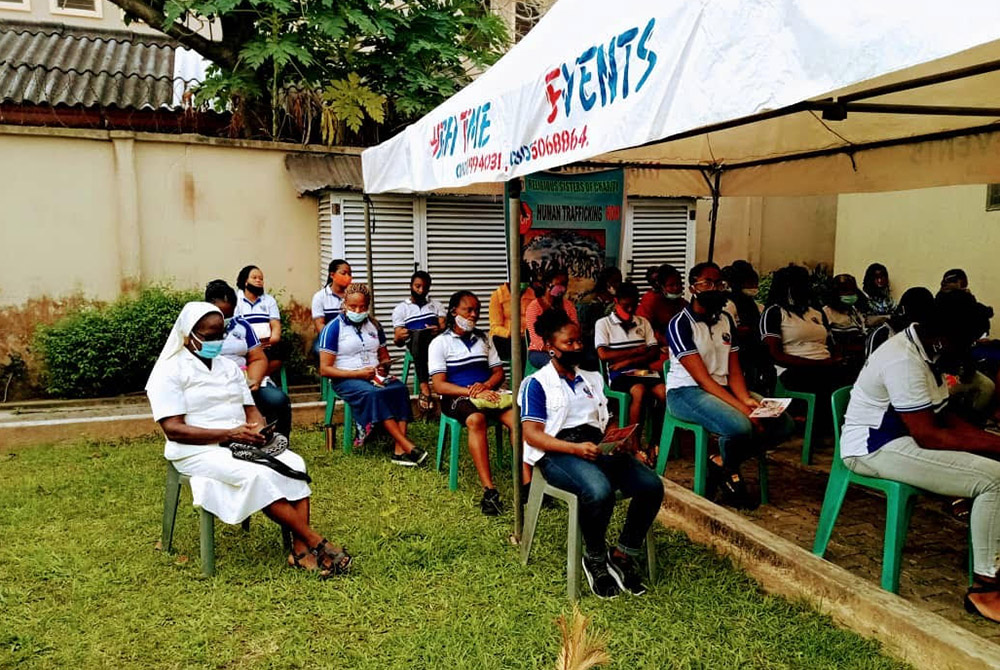
Participants listen during a workshop on human trafficking at St. Anne's Centre for Women and Youth Development, Feb. 8 in Lagos. The workshop was part of the outreach effort by sisters to educate people on the dangers and realities of trafficking. (Courtesy of Sr. Gloria Ozuluoke)
Through a group chat on WhatsApp, the Link Sisters share information, coordinate their activities and take action against human trafficking when needed. Specifically, they use it to mobilize and strategize against the different schemes used by the traffickers. Rural families are often targeted by traffickers with false promises of jobs and scholarships in the cities. Parents give up their teenage and sometimes younger children, who are then exploited in brothels or labor camps. Even local athletes are vulnerable, with football players being approached for "opportunities" abroad which really turn out to be trafficking rings or for harvesting human organs.
"They ensure that they organize programs and identify with people at the grassroot so they can receive information of any moves for human trafficking," Ozuluoke said of the Link Sisters. "They also organize awareness programs with local parishes, schools and hold town hall meetings."
Ozuluoke's congregation is among many spreading the word on human trafficking in the country. Several congregations under the Nigeria Conference of Women Religious and nonprofits across the country are working together on projects against human trafficking. Organizations like Talitha Kum, UNANIMA International and Misean Cara are also part of the sisters' networks of partners against human trafficking.
"We engage in collaboration, networking and advocacy," Ozuluoke said. The strategy is to "educate people not to get even trafficked or get into the dangers in the first place," she said. "That is why we ensure we do training, raise awareness and do advocacy programs wherever we are."
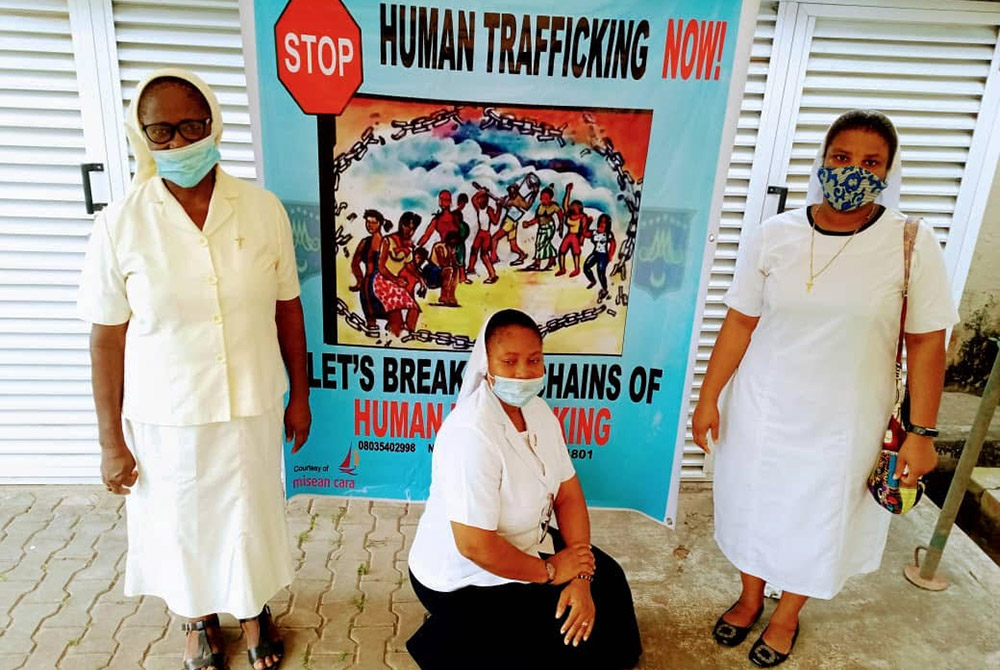
From left: Srs. Justina Nelson, Ngozi Monye and Gloria Ozuluoke after a workshop on human trafficking, held Feb. 8 at St. Anne's Centre for Women and Youth Development in Lagos. The sisters say fighting human trafficking is an integral part of their ministry. (Courtesy of Sr. Gloria Ozuluoke)
Her congregation also helps to rehabilitate trafficked persons and makes referrals to religious communities with shelters, like the Committee for the Support of the Dignity of Woman — an anti-trafficking nonprofit organization and home for victims established in 1999 by the Nigeria Conference of Women Religious. More than 50 women religious congregations are members of the organization, which provides counseling and rehabilitation services.
The Sisters of St. Louis run the Bakhita Empowerment Centre — a shelter for survivors of trafficking in Lagos. Eight women are currently living there with their children. Sr. Patricia Ebegbulem, coordinator of the center, says the women are taught some skills to help them become independent.
"We are trying to establish a skill acquisition center in our home here because every day, they leave the home to go to the Inspire Vocational Academies to learn hairdressing, tailoring and catering," she said. "In our home, we teach them bead-making and baking. We just started baking for sustainability and trying to sell but it's in a process."
Providing for the women's needs and equipping them with skills to be independent costs a lot, Ebegbulem told GSR. For each training course, a general registration fee of 100,000 naira ($263) is paid for each candidate, and other fees depend on the skill they want to learn, ranging from 140,000 naira ($368), 200,000 naira ($526) and 300,000 naira ($788) for hairdressing, tailoring and catering respectively. Transportation to the skills center also incurs costs, she said. "We keep sourcing for funds and writing proposals and sometimes, generous people support us through contributions," she said.
From a workshop Ebegbulem attended on human trafficking about three years ago, she's adopted the policy to stop calling trafficked persons "victims" and instead use the word "treasures."
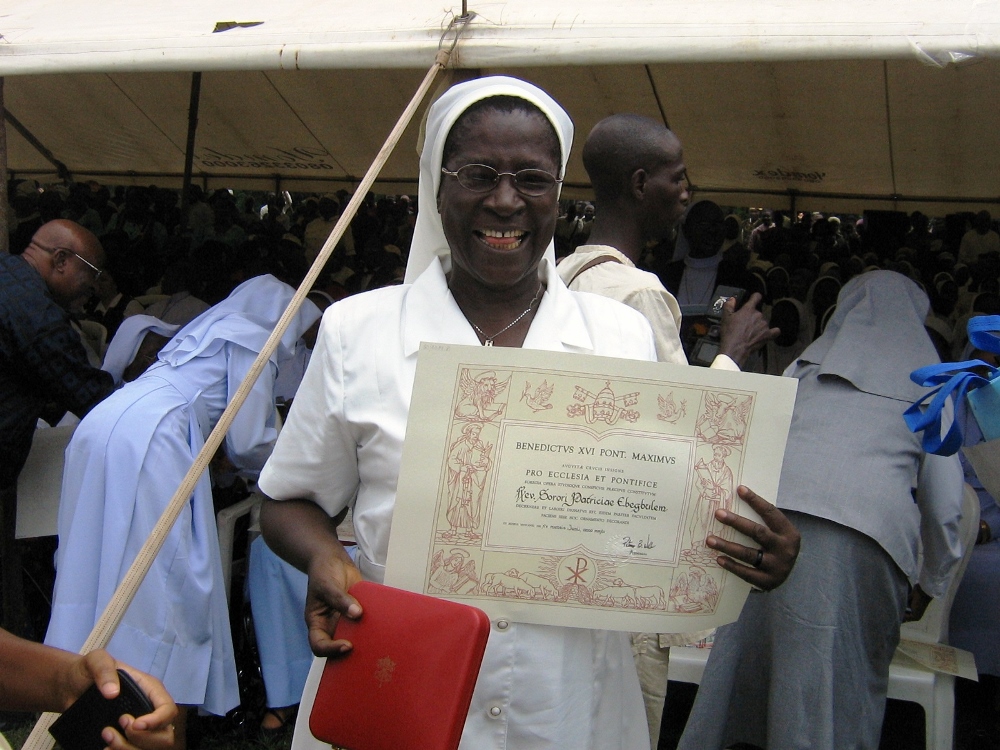
Sr. Patricia Ebegbulem holds her certificate at an award ceremony in 2012 where she received the Pro Ecclesia et Pontifice medal. (Provided photo)
"We want them to feel that they are treasured, they are valued and not victims or commodities to be sold in an open market," said Ebegbulem, who is the author of an anti-trafficking handbook for schools sold locally in Nigeria, called "Stop Trafficking in Women and Children: It's a Crime Against Humanity," with a revised edition published in 2018. "These are people who have been so traumatized, rejected and dejected so we want them to feel accepted."
When the women come to the shelter, their self-esteem is destroyed, she said. "We try to heal them of their hurts, to build up their sense of dignity because many of them see themselves as shadows," she said. "We don't want to call them victims because they are already victimized."
The work of Catholic women religious in Nigeria against trafficking is having positive effects, said Sr. Eucharia Madueke, a Sister of Notre Dame de Namur. "People are taking an active role in terms of human trafficking because of the way we have raised awareness on the issue," she said.
Madueke's congregation works with the Africa Faith and Justice Network, or AFJN — a Washington-based Catholic advocacy group where she is the Women's Empowerment coordinator. The AFJN has 16 congregations in Nigeria as members and dozens of volunteers, including lawyers, activists, and laypeople.
Currently, Madueke's congregation and AFJN's attention is moving towards the coastal southern part of the country where trafficking happens regularly, with little awareness to end it. Plans for a workshop in July in the region are underway. The workshop will bring together about 50 sisters from different congregations. Madueke said the region is the second largest hub for trafficking in the country. Key highlights of the event are to raise awareness through street advocacy and campaigns, and meet local politicians, lawmakers, and the police to encourage them to take action against human trafficking.
Engaging the police is particularly important, she said. "If they can cooperate in holding the traffickers accountable and prosecute them, it would be very important in the fight to end trafficking," she said. "We will also do grassroots mobilization and when we finish that, the sisters in that area will learn how to carry on with the advocacy when we leave to somewhere else."
Internal trafficking
Fighting internal trafficking and against child abuse and child prostitution is also at the heart of the works of the sisters. Children from poor families are often given to other Nigerians as housemaids where they are subjected to inhuman treatment such as rape, hawking, street begging and/or branded as witches by their caregivers.
Ozuluoke says this leads to internal trafficking and smuggling. She and other women religious and members of other nonprofits have engaged in street demonstrations against this practice to raise awareness and discourage it.
As Pathfinders Justice Initiative reports, it's estimated that 75% of those who are trafficked within Nigeria are trafficked across states, while 23% are trafficked within states, according to a NAPTIP report from 2016, the most recent data available. Only 2% of those who are trafficked are trafficked outside the country.
"Internal trafficking is on the increase, not just only external trafficking," she said. "If someone who is a minor is a housemaid and being sexually exploited and their dignity is being denied, we educate them to know that they can also be used for organ harvesting or when they are taken to Europe by a relative, they can be used as housemaids and later turned to slaves or sold into prostitution."
Many boys and girls are exploited as domestic workers and trafficked and their parents are not aware, added Madueke. She has specifically organized awareness programs on abuse of children. "They think their children are in good hands but that is often not the case."
'We are not deterred by the challenges'
The sisters face obstacles fighting and campaigning against human trafficking in Nigeria. Sociocultural factors sometimes contribute to this, especially when community leaders and parents are resistant and not open to learning about the dangers of human trafficking. Ozuluoke says they cannot be deterred by the challenges.
"Sometimes, the survivors can be re-trafficked even when they are back if they are not followed up," Ozuluoke said. "We are not deterred by the challenges because we have always devised new ways of being able to reach out to people and ensure that they have the right information and to empower the women and the girls because most of the time they are the victims."
Official access to public schools for awareness campaigns on human trafficking has become a problem because of bureaucracy, she said. The COVID-19 pandemic has also exacerbated the situation. But the Ministry of Education in Lagos state recently granted the congregation approval to carry out awareness programs on human trafficking in public schools in the region while maintaining COVID-19 safety protocols. That is good news for the congregation and the work they do, Ozuluoke said.
Advertisement
Dangerous Work
Security is always a serious concern because fighting against human trafficking is a dangerous in Nigeria and around the world, Madueke said.
"Whenever you do advocacy against human trafficking, you are putting yourself at a risk because you could be attacked," she said. "The risk is that traffickers are all over the place and they form a syndicate to do this. So, whenever you are talking about human trafficking, you know you are stepping on somebody's illegal means of making money or ascending that economic power. Then the safety of the sisters participating in our programs is another issue."
Funding is always a challenge as the sisters struggle to accommodate for the logistics of those attending their programs, Madueke said. Some support and funding has been received from Talitha Kum and Misean Cara, who assist in producing awareness programs and materials such as public awareness announcements and radio appearances, Ozuluoke said.
Despite the challenges, the sisters are still optimistic and say the work must go on. For them, prayer and action will help in ending human trafficking and bring healing to victims.
"Prayer for us people of faith lead us back to action," Madueke said. "But I also feel that action targeted at the government is needed because no matter what we do, if the government doesn't take action, it is not going to stop. And that is why I believe so much in engaging the government through advocacy," she said. "Making them see why you need to have this law or take this action against trafficking is still very important."
Ozuluoke is happy about the progress made so far and the work ahead. "The success of this work is that people have been empowered and young girls are being able to recognize that they can actually report abuse and say 'no' and someone will listen to them," she said. "Men and women and girls and boys are able to recognize these issues. For us, human trafficking is an emerging societal ill that we will continue to fight against."

